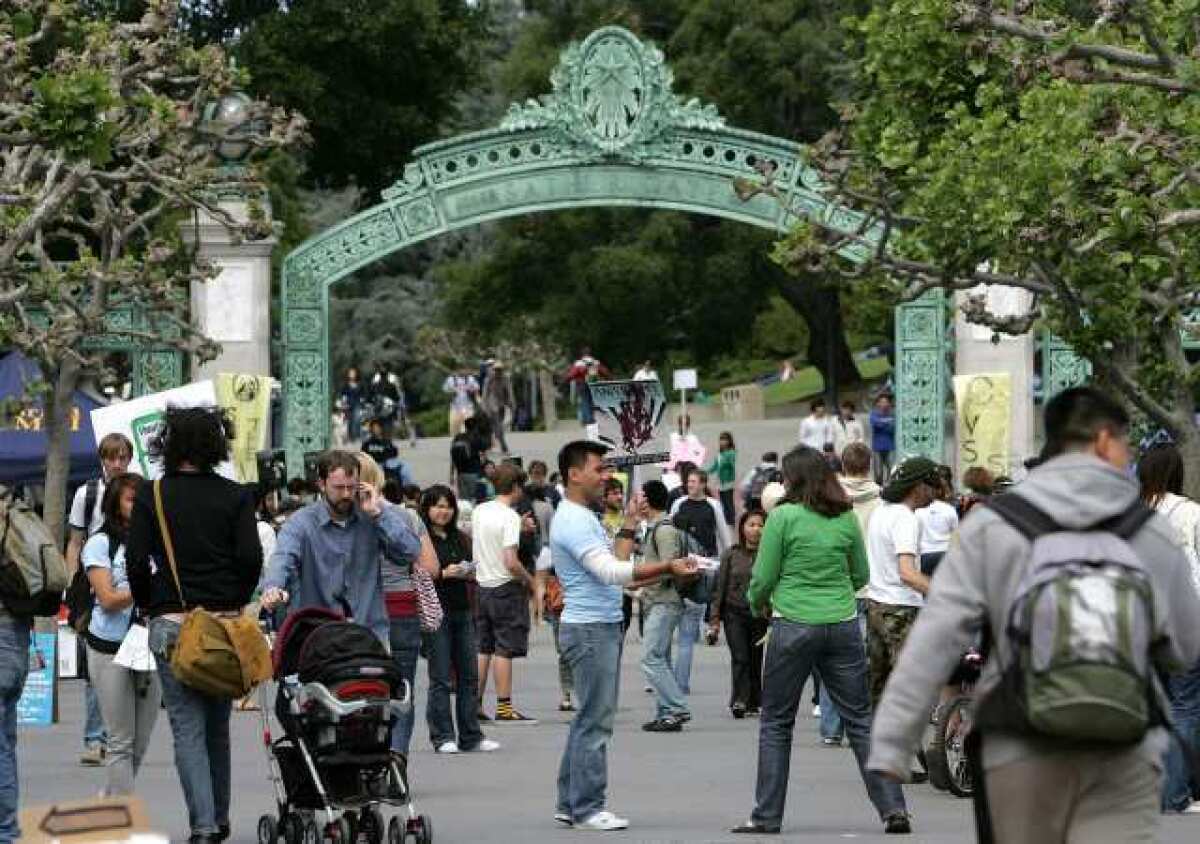UC Berkeley races to save its âheart and soulâ with new $6-billion fundraising quest

UC Berkeley is aiming to raise $6 billion â one of the largest hauls ever attempted by a public university â in a drive to preserve the âheart and soulâ of the elite campus, Chancellor Carol Christ announced Saturday.
Christ said the private funds will help cover costs for essential investments needed to secure Berkeleyâs continued standing as one of the worldâs most prestigious public research universities: 100 new tenure-track faculty members, undergraduate scholarships, 300 new graduate student fellowships, affordable student housing and research support.
âThis is not a campaign about ânice to have,ââ Christ said. âThis is a campaign to raise money for the very core of the institution.â
The massive fundraising effort comes as the campus, which celebrated its 150th anniversary in 2018, aims to recover from years of diminishing state aid and recent financial turbulence. State funding has plummeted to just 14% of Berkeleyâs budget compared to 50% three decades ago, and the campus faced a $150 million budget deficit in 2016, closing that gap last year.
Berkeleyâs budget pressures are shared among UC campuses, where recent increases in state funding have not kept pace with growing enrollments or come close to restoring previous levels of support. State funding has fallen from 84% of UCâs core budget in 1990 to 42% today, as the bulk of the financial burden has shifted to students and their families.
To fill the gaps, UC campuses have ramped up efforts to raise private dollars, collectively netting $2.7 billion in 2018-19 compared to $1.3 billion in 2009-10, according to a UC annual report. The totals differ dramatically among campuses: $733 million for UCLA and $555 million for Berkeley; $23.8 million for Riverside and $5.6 million for Merced.
Berkeleyâs announcement comes just days after UCLA announced it completed a $5.49 billion fundraising campaign, surpassing its initial goal of $4.2 billion 18 months early. UC San Francisco already has exceeded its $5 billion goal while UC San Diego is aiming to raise $3 billion after meeting its $2 billion target three years early.
In addition, UC Riverside has launched its first ever comprehensive fundraising campaign of $300 million, a reflection of its smaller size and less access to affluent alumni and supporters.
Christ said campuses can no longer rely primarily on state support to solve their financial problems. Berkeley staunched its red ink last year by reducing 500 administrative staff positions but also raised alternative revenue through aggressive fundraising, expanded summer sessions and certificate programs for business executives, among other initiatives.
âThe state is, of course, still an extraordinarily important partner,â Christ said, âyet we also have to be much more entrepreneurial and our own diversification and multiplication of sources of revenue in this campaign is an important piece of that strategy.â
Increasing tenure-track faculty and top-flight graduate students is a pressing priority, campus officials said. The faculty, which includes more than 20 Nobel laureates, is the âdefinitive factorâ that gives Berkeley its edge in shaping the next generation of leaders, Provost Paul Alivisatos said.
But, in the past five years, the number of tenure-track faculty has declined by 2% to 1,466 while the number of Berkeley undergraduates increased 14% to 29,010 last spring. As a result, classes have ballooned in size: Christ told regents in 2018 that the average size of lower-division engineering and computer science classes had increased from 65 in 2011-12 to 227 in 2016-17.
Another campaign priority is to provide 300 new graduate student fellowships to more than double the current level, to help Berkeley compete for the worldâs brightest young researchers. With some 12,000 graduate students, Berkeley is one of the top five U.S. universities for granting doctoral degrees and has more than 110 advanced degree programs ranked in the top 10.
âWeâre not losing our competitive edge in faculty recruitment and in graduate student recruitment,â Christ said, âbut if we donât keep pace, we might.â
Christ said Berkeley will aim to vastly increase funding for financial aid for more undergraduate scholarships. The university also wants to decrease the $10,000 a year UC students are expected to contribute to their education by working, for instance, or taking out loans. So far, the campaign has raised $236 million for student support and officials hope to double that by the 2023 completion date.
And officials are hoping to double the number of campus beds to provide affordable housing for freshmen, sophomores and first-year transfer students in one of the nationâs priciest housing markets.
âWe are raising funds for our core needs and activities ⦠for the heart and soul of the university and all that sets Berkeley apart from the crowd,â Christ said.
Berkeley is already halfway toward its goal, having raised $3.4 billion since it began the campaignâs âquiet phaseâ in January 2014. So far, nearly 169,000 donors â in every state and 121 other countries â have contributed more than 614,000 gifts.
The donations include Berkeleyâs largest single gift ever â $252 million from an anonymous donor to provide core funding for a new home for the Division of Computing, Data Science and Society, the campusâ fastest growing areas of study. The âData Hubâ will bring together researchers to tackle challenges such as climate change, public health and criminal justice policy using machine learning, artificial intelligence and advanced statistics.
Another landmark gift of $50 million to Berkeleyâs College of Natural Resources will help support initiatives to adapt to climate change, promote clean energy and improve food security. Part of the gift from former college dean Gordon Rausser will help establish an endowed chair in the college.
Other research areas targeted for expansion include health, democracy and equality, and innovation and entrepreneurship.
More to Read
Sign up for Essential California
The most important California stories and recommendations in your inbox every morning.
You may occasionally receive promotional content from the Los Angeles Times.











